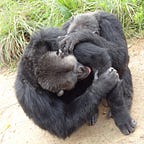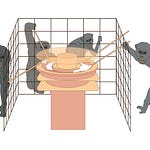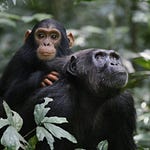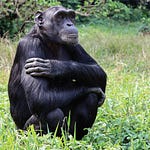In a rainforest clearing, two bonobos sit shoulder to shoulder, fingers sifting through fur with the kind of quiet attention most primatologists envy. A few meters away, a pair of chimpanzees groom with equal focus, though their circle is tighter, their glances less inviting. On the surface, these are ordinary primate scenes: hair, patience, and the slow work of trust. Beneath them lies a pattern that might bind us across species.
A new cross-institutional study1 argues that chimpanzees and bonobos do something remarkably familiar. They divide their social world into layers. A handful of close bonds get the most attention, while weaker ties stretch outward in concentric rings. This shape echoes the so-called “social circles” seen in humans, from intimate confidants to distant acquaintances.
The finding hints at an ancient architecture of social life, one sculpted not only by culture but by biology, cognition, and the unforgiving constraints of time.










